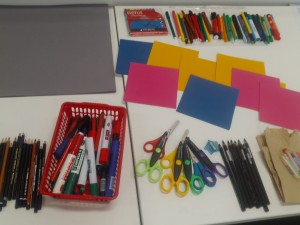
Building on the momentum from our successful Creative Connections event in summer 2016, East Midlands Writing PAD are running a series of termly workshops for PGR students at DMU, building on the themes of visual, tactile and creative research development.
The first of these workshops was held on the 30th November, led by Harriet Edwards, founder member of Writing PAD: Harriet currently works for Central St Martins, Middlesex University and the Royal College of Art.
The session was attended by students from all four faculties, and attendees were at varying points in their research, from one student who was at the writing up stage, to another who had attended induction the previous day.
Harriet started by asking students why they had come along to the session: answers varied from wanting to use the visual to aid communication to a dislike of writing, with one student commenting that they had attended the Writing PAD Creative Connections event in July and found this interesting and useful.
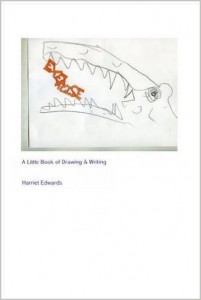
Harriet shared some of the experiences from her own PhD, and talked about the resulting ‘Exercise: A Little Book of Drawing and Writing’. This book came out of an exploration and in some ways, an affirmation of practice, particularly on the design and applied arts side. It was seen as a means of capturing and generating, with both the drawing and writing as insights – i.e. relating to reflective writing but not exactly that.
The workshop embodied this exploratory approach to drawing and writing: initially, the students were asked to select some paper of their choice and to do some mark-making exercises, moving the hand across the page and creating repeated patterns.
After this initial warm-up, Harriet explained that the next activity would involve a journey, not related to the students’ research – the idea being to de-clutter the mind. There was a sense of quiet concentration in the room when Harriet led the participants on a journey, which they drew onto large sheets of paper.
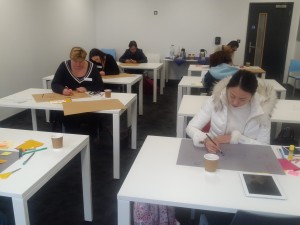
This was a kind of guided visualisation, where Harriet gave a prompt very few minutes, which the students had to respond to by drawing their own personal journeys. The prompts, or stages in the journey were as follows:
- One small element of the landscape
- Something to eat
- Climbing something
- A person that you meet
- You are very lost – draw that experience
- You are not lost any more and find a place to sleep
- Waking up, you see a danger ahead
- Escape from danger
- 2 more things you see or experience on your way home
- Arriving back home
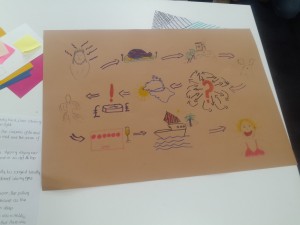
Once the drawings were completed, the students were asked to complete some writing based on their visual journeys. The writing could be in one of three formats:
- A poetic form, looking back on the journey and focusing on the five senses, with each line starting: ‘I remember’.
- A reflective diary of the journey.
- A travel guide based on your experience of the journey, giving advice to others.
The students could choose from a variety of materials to write on: A4 paper, origami paper, postcards or post-its. They could also choose to write on the same sheet that contained their illustrated journey. Around 15 minutes went by, with students quietly and busily writing out their journeys in textual form.
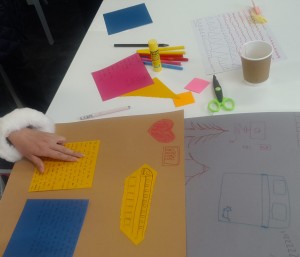
After a break, the students were asked to share their journeys: the group walked around to each table, and each participant talked us through the visual journey or read out the written version. There was a broad variety of journeys: some fantastical, some more everyday, some spiritual. It was fascinating to see how this seemingly simple exercise could result in such an array of creative responses.
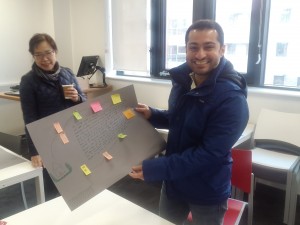
The workshop concluded with a group discussion, thinking about how this type of activity connects to individual research and writing at PhD level. Ideas that came out of this included:
- Using doodling before writing to unblock ideas and help writing to flow.
- Drawing can clear and ‘de-clutter’ your mind for writing.
- The workshop activities felt like meditation – a break from the PhD.
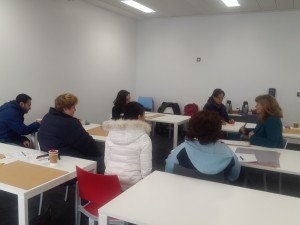
Feedback from the session was very positive, and all students found the workshop useful. The best thing about the event was described as:
- ‘I am not good at drawing, but I drew my mind inside and everyone understood it.’
- ‘Very accessible & open, with a very friendly group.’
- ‘Giving you other approaches for getting into writing.’
- ‘Visualising writing before starting helped to break down my usual barriers.’
- ‘This workshop enhances my ability to visualise my concepts before putting them into proper writing.’
Further Writing PAD workshops for DMU PGR students will be held later in the year:
Infographics workshop on 8th March 2017.
LEGO workshop on 28th June 2017.
To book, please email rtp@dmu.ac.uk
That’s all from Writing PAD East Midlands for 2016, thanks to all the friends and collaborators who have worked with us this year, and see you in 2017,
Julia
[…] You can read more about Harriet Edwards’ work with research students here […]